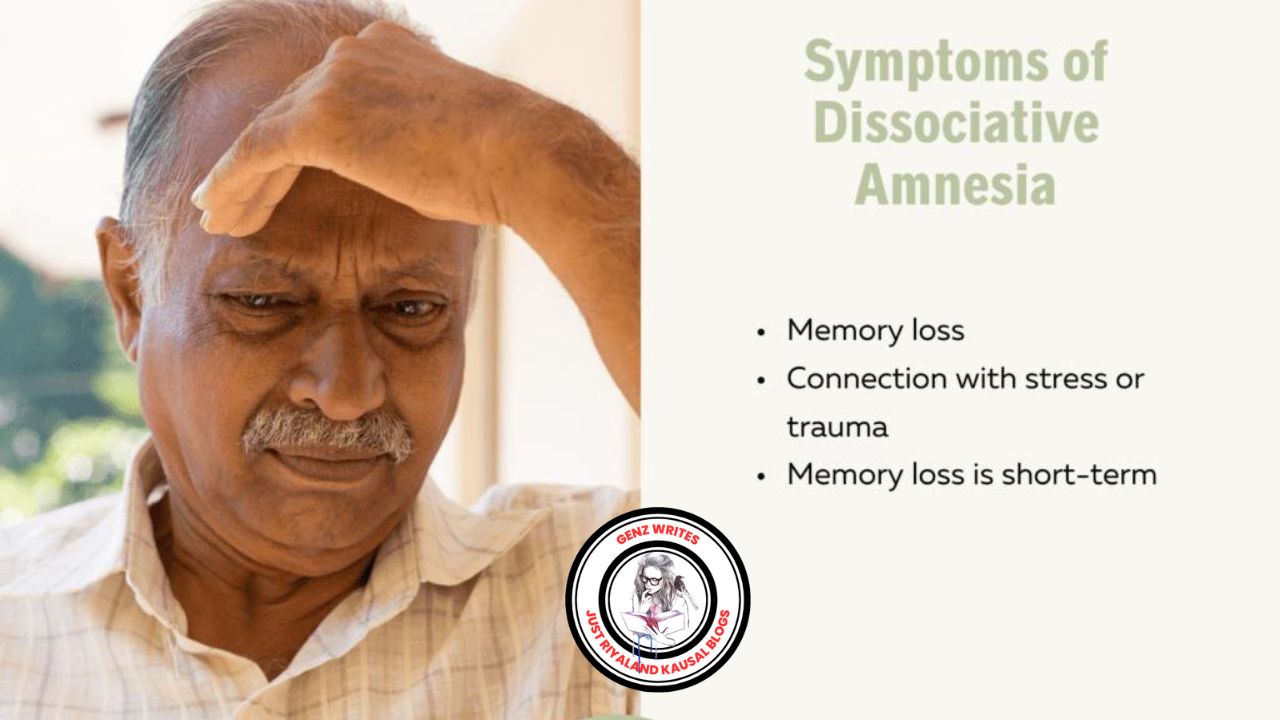Dissociative amnesia is a mental health condition characterized by an inability to recall important personal information, typically related to traumatic or stressful events. Unlike ordinary forgetfulness, this memory loss is significantly disruptive to daily life.
People experiencing dissociative amnesia may forget:
- Personal information such as name, occupation, or family
- Specific events or periods
- Important autobiographical details
It's crucial to differentiate dissociative amnesia from other types of memory loss, such as those caused by physical brain injuries or substance abuse. Follow us here at WazirX Recovery Plan
Diagnostic Criteria
According to the Diagnostic and Statistical Manual of Mental Disorders (DSM-5), the diagnostic criteria for dissociative amnesia are as follows:
- An inability to recall important personal information (usually of a traumatic or stressful nature) that is inconsistent with ordinary forgetting.
- The symptoms cause clinically significant distress or impairment in social, occupational, or other important areas of functioning.
- The disturbance is not attributable to the physiological effects of a substance (e.g., alcohol or other drug abuse, a medication) or a neurological or other medical condition.
Impact on Daily Life
Dissociative amnesia can significantly disrupt a person's daily life. Here are some common impacts:
- Difficulty with relationships: Memory gaps can strain relationships with family, friends, and partners.
- Occupational challenges: Inability to remember work-related information or tasks can lead to job loss or difficulties in career advancement.
- Financial problems: Challenges managing finances due to memory loss, such as forgetting to pay bills or making impulsive purchases.
- Legal issues: Memory gaps can create difficulties in legal matters, such as testifying in court or handling legal documents.
- Emotional distress: Anxiety, depression, and feelings of isolation often accompany dissociative amnesia.
- Safety concerns: Memory loss can impair judgment and decision-making, increasing the risk of accidents or injuries.
Associated Features Supporting Diagnosis
While the core criteria focus on memory loss, several associated features can help support the diagnosis of dissociative amnesia:
- Dissociative fugue: In some cases, individuals with dissociative amnesia may experience dissociative fugue, where they travel to a new location and assume a new identity, without memory of their past.
- Trauma history: A history of significant trauma or stress is often associated with dissociative amnesia.
- Psychogenic symptoms: Additional psychological symptoms, such as depression, anxiety, or sleep disturbances, may be present.
- Rule out organic causes: It's essential to rule out physical or neurological causes of memory loss, such as head injury or dementia.

Signs and Symptoms
The primary symptom of dissociative amnesia is *memory loss* that goes beyond normal forgetfulness. This memory loss typically relates to traumatic or stressful events.
Here are some specific signs and symptoms:
- Memory gaps: Difficulty recalling specific events, periods, or personal information.
- Loss of personal identity: In severe cases, individuals may be unable to remember their name, occupation, or family.
- Disorientation: Confusion about time, place, or person.
- Dissociative fugue: In rare cases, individuals may travel to a new location and assume a new identity without recollecting their past.
- Emotional distress: Feelings of anxiety, depression, or guilt may accompany memory loss.
- Difficulty with daily activities: Challenges in work, relationships, or other responsibilities due to memory problems.
Prevalence
Determining the exact prevalence of dissociative amnesia is challenging. Several factors contribute to this, including underreporting due to stigma and the difficulty in accurately diagnosing the condition.
That being said, available estimates suggest:
- General population: Prevalence rates vary widely, from 0.2% to 7.3%.
- Psychiatric settings: The condition is more commonly diagnosed in psychiatric inpatient and outpatient settings, with rates ranging from 7% to 11%.
It's important to note that these are estimates, and the actual prevalence might be higher due to underreporting.
Development and Course
Development
- Trauma or stress: Dissociative amnesia typically develops as a response to severe or prolonged trauma or stress. This can include physical, emotional, or sexual abuse, combat, or natural disasters.
- Dissociation: To cope with the overwhelming emotional pain associated with trauma, the mind may dissociate or disconnect from the traumatic memory. This dissociation can lead to memory loss.
Course
- Acute onset: Often, dissociative amnesia begins suddenly following a traumatic event.
- Variable duration: The duration of memory loss can vary widely from hours to years.
- Memory recovery: In many cases, memory gradually returns, either spontaneously or with therapy.
- Recurrence: Some individuals may experience recurrent episodes of dissociative amnesia.
- Associated symptoms: Depression, anxiety, and other psychological symptoms may accompany dissociative amnesia.
Risks and Prognostic Factors
Risks Associated with Dissociative Amnesia
While dissociative amnesia itself is not directly life-threatening, it can lead to significant challenges and distress. Some of the potential risks include:
- Impaired functioning: Difficulty in maintaining relationships, employment, or daily activities due to memory loss.
- Emotional distress: Anxiety, depression, and feelings of isolation can accompany the condition.
- Increased vulnerability: Individuals with dissociative amnesia may be more susceptible to exploitation or victimization due to impaired memory and judgment.
Prognostic Factors
Several factors can influence the outcome of dissociative amnesia:
- Severity of trauma: The intensity and duration of the traumatic event can impact the severity and duration of memory loss.
- Early intervention: Seeking professional help promptly can improve the chances of recovery.
- Therapeutic alliance: A strong therapeutic relationship can facilitate the treatment process.
- Support system: A supportive network can provide emotional support and practical assistance.
- Comorbid conditions: The presence of other mental health disorders may complicate the treatment process.
Culture-Related Diagnostic Issues
Culture significantly influences how individuals experience, express, and understand mental health conditions. This is particularly relevant in the context of dissociative amnesia.
Key Cultural Considerations
- Cultural Explanations of Distress: Different cultures have varying explanations for memory loss. For instance, some cultures might attribute memory problems to spiritual or supernatural causes.
- Stigma: The stigma associated with mental health conditions, including dissociative amnesia, varies across cultures. This can influence the willingness of individuals to seek help or disclose symptoms.
- Trauma and Culture: Cultural factors can shape the types of trauma experienced and how individuals cope with trauma, potentially influencing the development of dissociative amnesia.
- Somatization: In some cultures, psychological distress might manifest primarily as physical symptoms, which could complicate the diagnosis of dissociative amnesia.
Diagnostic Challenges
- Overdiagnosis or Underdiagnosis: Misunderstanding of cultural expressions of distress or biases can lead to either overdiagnosis or underdiagnosis of dissociative amnesia.
- Difficulty in Assessment: Accurately assessing dissociative amnesia requires a deep understanding of the individual's cultural background and experiences.
- Treatment Challenges: Cultural factors can impact the effectiveness of treatment, as it's essential to consider these factors when developing a treatment plan.
Suicide Risk
Suicide Risk
While dissociative amnesia itself does not directly cause suicidal ideation, it can contribute to increased suicide risk indirectly. Individuals experiencing dissociative amnesia often experience:
- Severe emotional distress: Feelings of isolation, confusion, and despair can be overwhelming.
- Difficulty functioning: Challenges in daily life, work, and relationships can lead to a sense of hopelessness.
- Comorbid mental health conditions: Depression, anxiety, or post-traumatic stress disorder (PTSD) often accompany dissociative amnesia, increasing suicide risk.
- It's essential for mental health professionals to carefully assess suicide risk in individuals with dissociative amnesia and provide appropriate interventions.
Functional Consequences
Dissociative amnesia can significantly impact a person's ability to function in various life areas. Some common functional consequences include:
- Impaired memory: Difficulty remembering important information, such as appointments, personal details, or work-related tasks.
- Relationship difficulties: Challenges in maintaining relationships due to memory gaps and inconsistent behavior.
- Occupational problems: Difficulty holding a job or advancing in a career due to memory-related issues.
- Academic struggles: Challenges in school or university due to memory loss and difficulty concentrating.
- Financial difficulties: Problems managing finances due to forgetfulness or inability to recall financial obligations.
- Legal issues: Memory gaps can lead to difficulties in legal matters, such as testifying in court or handling legal documents.
Differential Diagnosis
Differential diagnosis involves considering other possible conditions that might explain a patient's symptoms. It's crucial to distinguish dissociative amnesia from other disorders to ensure accurate diagnosis and appropriate treatment.
Here are some conditions often considered in the differential diagnosis of dissociative amnesia:
- Neurological conditions: Dementia, Alzheimer's disease, brain injury, or seizures can cause memory problems.
- Substance-induced amnesia: Alcohol or drug abuse can lead to memory loss.
- Psychological factors: Depression, anxiety, or severe stress can impair memory.
- Malingering or factitious disorder: In rare cases, individuals may intentionally feign memory loss.
Comorbidity
Dissociation often co-occurs with other mental health conditions. This is referred to as comorbidity. Some common comorbidities include:
- Post-traumatic stress disorder (PTSD): Given the often traumatic events that precede dissociative amnesia, PTSD is frequently seen together.
- Depression: The emotional distress associated with memory loss can lead to depressive symptoms.
- Anxiety disorders: Anxiety, including generalized anxiety disorder or panic disorder, can accompany dissociative amnesia.
- Substance abuse: As a coping mechanism to deal with emotional distress, individuals might turn to substances.
- Personality disorders: Conditions like borderline personality disorder or avoidant personality disorder can sometimes co-occur.

Treatment and Management
While there's no specific medication to directly treat dissociative amnesia, the focus is primarily on psychotherapy and supportive care.
Psychotherapy
- Trauma-focused therapy: This is often the first line of treatment, addressing the underlying trauma that may have triggered the amnesia.
- Cognitive-behavioral therapy (CBT): Helps individuals develop coping strategies, challenge negative thought patterns, and manage anxiety.
- Supportive therapy: Provides emotional support and guidance as individuals navigate the challenges of memory loss.
Medication
While not directly treating amnesia, medications might be prescribed for associated conditions:
- Antidepressants: For depression, which is common in individuals with dissociative amnesia.
- Anxiolytics: To manage anxiety symptoms.
- Sleep aids: If sleep disturbances are present.
Self-Care and Support
- Support groups: Connecting with others who have similar experiences can be beneficial.
- Stress management techniques: Relaxation techniques like meditation or yoga can help manage stress and anxiety.
- Building a support network:* Having supportive friends and family can provide emotional support.
It's crucial to remember that recovery from dissociative amnesia is a gradual process. Patience, understanding, and professional guidance are essential.